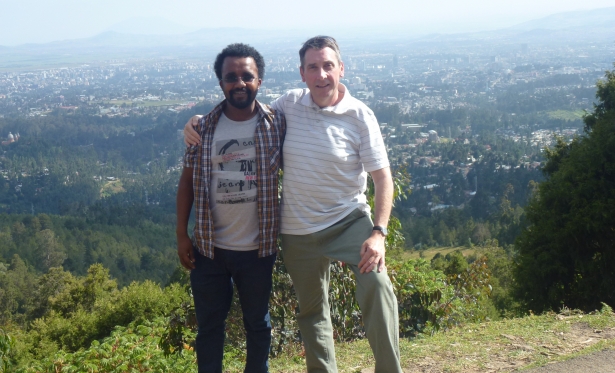Doing the right thing: AfID career changer Adrian chats to NQ Magazine03.01.2020
NQ Magazine: Doing the Right Thing
Between 2011 and 2014, Adrian undertook annual volunteering assignments with AfID. What started as a way of making holidays more meaningful turned into a desire to transition into the international development sector altogether. After over a decade in the corporate sector, Adrian made the jump – read on to find out how he did it.
Why did you choose to volunteer? Was it part of a planned career change?
Initially, I was looking for a different way to use my annual leave that would provide more immersive overseas experiences. In 2011, I read an article about AfID in CIMA’s FM Magazine that sparked my interest; I signed up for my first volunteer assignment and spent three weeks in Uganda. It was different to anything I had done before and I would never have imagined how enjoyable I found the whole trip. I was hooked.
At that time, I was not thinking of a career change and I planned that an annual volunteering trip would be my main holiday each year. However, over the next four or five years I became attracted to the idea of a permanent role in the ID sector and started planning how to make it happen.
Why did you choose to work in the International Development sector?
Volunteering was a great start, but I started to feel frustrated that my involvement was limited to a few weeks a year while I carried on working in an environment that was almost exclusively profit-focused. In 2016, I was offered voluntary redundancy from my corporate job and didn’t think twice about taking this perfect opportunity to move across into the International Development sector. I haven’t regretted that decision once.
Do you feel your voluntary experience with AfID helped you gain your roles at ActionAid and The Freedom Fund, as well as prepare you for life in the sector? If so, how?
Definitely. I remember the AfID workshop addressed the common fear that corporate sector experience would not be transferable to the NGO sector. The basic finance skills required in both sectors are the same – using spreadsheets, completing reconciliations, etc. – but the intentions can be very different. One example is the approach to take when reviewing project accounts.
In the corporate sector it is generally desired to have an underspend vs. budget, but for an INGO project a significant underspend is bad news because the objective is to fully use all donated funds. So, volunteering provided me with intermediate experiences to prepare me for the ways of working in an INGO finance role. Volunteering also demonstrates to prospective employers that I had the interest, passion and desire to work in the sector.
Where are you working now? Can you tell us a little about your current role and your path to getting to this role?
My current role is as Program Finance Manager for The Freedom Fund, a relatively small INGO working to eradicate modern slavery. My role is principally to provide finance support to the Programs Teams. The Finance team is small, just four people, so there is a lot of responsibility and involvement in many other parts of the whole operation. This is the role I wanted when I first decided on a permanent role in the INGO sector as it sits on the interface between traditional finance roles and operations, which is the most interesting and rewarding position for me.
However, I knew that I would be a stretch to get such a role as my first position after moving from the corporate sector, so I first joined ActionAid in internal audit as this was knowledge/ experience that is directly transferable between the sectors. It is also a great role in which to learn more about how INGOs operate. I stayed with ActionAid for two years, by which time I had learned enough about INGO finance and was able to successfully apply for my ideal role.
What are the main differences between a finance role in the corporate and charity sectors?
At a fundamental level, the difference between finance processes comes from the basic objectives of the sectors; corporate organisations aim to make money for the shareholders whereas charity organisations aim to spend money that has been donated to them. Most finance roles in the corporate sector aim to protect value; in the charity sector fi nance is working to ensure that donated funds are being used completely and effectively.
What would be your advice to other accountants considering a similar career change or looking to break into the sector?
It should be a given that anyone applying for a role has the basic qualifi cations and fi nance skills mentioned in the role description. However, to get ahead and secure your ideal position it is essential to demonstrate experience that is important to the recruiter. In my case it was internal audit but there are others (e.g. project accounting, fi nancial modelling). Equally, showing an interest and passion for charity/ NGO work is important because this helps answer the standard question, “why do you want to work in the charity sector (or for this organisation)?”
It is typical, but not always true, that salaries are lower in the charity sector than the corporate sector for similar roles so having a valid, understandable reason for accepting less money is essential. Volunteering is an excellent way to gain sector experience, learn appropriate skills and, importantly, test out if this is really something that inspires and drives you.
For more information on Accounting for International Development visit www.afid.org.uk or contact them at info@afid.org.uk / 020 8741 7000.
Read the full article in the January 2020 issue of NQ Magazine here.



.JPG)